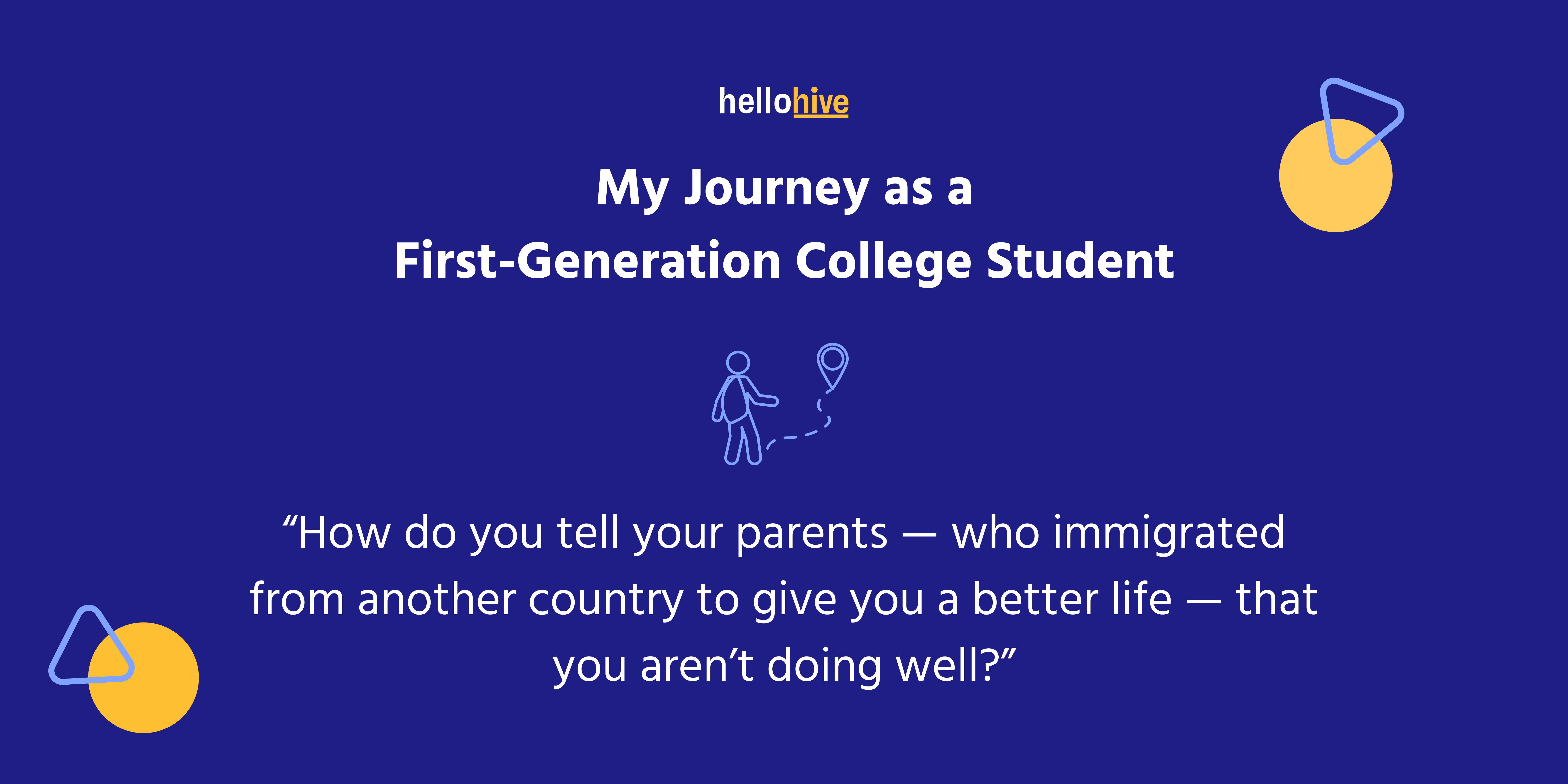The Pressure to Succeed
Upon coming to college, I felt like such a small fish in a big sea. Everyone around me had parents, grandparents, and even great grandparents who had attended college, but I was among the few who had no idea what they were doing or what college had in store for me. Only 27% of first-generation college students graduate in four years and I felt like I was going to be part of the 73% that didn’t.
Like many other first-generation college students, I excelled academically in high school and didn’t exactly have to put forth my utmost effort in order to do well. I came to college under the pressure of my family to succeed above the rest and produce the same results that I made in high school. At first, I was beyond excited to make a mark and put myself in a good position to make my family proud, but then reality hit, and the course load slapped me in the face.
Dealing with Failure and Imposter Syndrome
I had never done so poorly and felt so low in my entire life. I felt a strong sense of imposter syndrome — I had no idea what I was doing and where I was going to go with my career. For many, there is no community in college to represent first-generation college students and allow them to share their struggles with others who may be facing the same problems
My whole life I wanted to be an orthopedic surgeon. I volunteered at hospitals, competed in HOSA events, and thoroughly enjoyed my pre-health classes. I had a passion and a dream to be the first one in my family to not only attend college, but also to become a doctor. My parents were probably more excited than I was and kept telling me to push through it.
The Struggle to Keep Up
I studied with any free time I had and practically lived in the library — the custodians even knew me by name, as I would often fall asleep in the library in order to wake up early and continue studying before going to take my exams. No one really told me how much I would fail and how much I would struggle. I didn’t have my parents to tell me that this is what college was like. If anything, I had to tell them with my head hung low that I kept failing tests I had studied hours for.
How do you tell your parents — who immigrated from another country to give you a better life — that you aren’t doing well? How do you tell them that you aren’t going to become the doctor that they’ve always dreamed of and make them proud? I struggled immensely with trying to figure out if pre-med was right for me. My mental health declined rapidly, and I honestly didn’t want to even attend college anymore. Not only was I struggling academically, but socially as well. I kept comparing myself to other successful students and was envious of everyone who had the connections to succeed.
Reevaluating My Career Path
I had no idea what I was going to do. I couldn’t see myself doing this for another decade of my life, but I was so afraid of failure — and failing my family, especially. My own doubt caused me to lose sight of who I was and what made me happy. I didn’t know what I wanted to do at that point, but I knew it was anything but what I was currently doing.
The one complaint I have about the public education system is that they don’t tell us about all of the exciting jobs and possible careers that are out there for us. While you’re growing up, you’re told you can either be a doctor, teacher, policeman, businessman, or a lawyer. It wasn’t until college that I learned about the immense field of careers and niche jobs that you can both have and enjoy.
Changing My Major
So, I took a leap of faith. I changed my major to something that I had always enjoyed doing on the side: marketing. The decision was not made lightly, and I remember countless nights crying, not knowing if it was the right choice, but it turned out to be one of the best decisions I have ever made in my life.
Finding Academic and Personal Fulfillment
Not only was I able to perform significantly better academically, but I felt like I was actually enjoying what I was learning for once. I didn’t feel like a failure anymore, and for once, I made a decision that appeased me instead of my parents. For many first-generation college students, telling your parents that you’ve completely changed your major sends them into absolute shock — as they may feel like you’ve wasted both time and money.
I didn’t want my parents to think that I was ungrateful for everything that they’ve done to get me to college, but once they saw how much I flourished and how much my mental health improved, I think they were proud that I learned something about myself.
Embracing Failure
I wouldn’t have been able to change my major if I never faced my failures. Prior to college, I barely faced failures in my life, and honestly took pride in that fact, but after being forced to face failure for days on end, I was no longer terrified of it. I learned to embrace my failures in order to overcome the obstacles that I will face in the future.
Reflecting on my Journey
I don’t regret being pre-med at all, even if I did take a lot of unnecessary classes for my new major — I still don’t believe it was a waste of time. I learned so much about myself and did a lot of self-reflection that allowed me to become even more resilient than before. At this point, I can say that I look forward to my failures — because I know I will learn from them and grow as a person.
I have been a first-generation student mentor at Baylor for about two years now — sharing my stories of failure with my mentees and giving them a safe space to vent and reflect on their college journey.
In the end, I still have a passion for helping people. Maybe not as a doctor, but in so many other ways. I have found it extremely enriching to be able to share my failures with others so that they do not feel alone.
The Challenges and Advantages of Being a First-Generation Student
Being a first-generation college student, you definitely feel like a minority. You always see students around you getting help or advice from their parents that you are unable to receive from your own. Some of my peers even get internships and jobs from their parents or family friends — people who have been through college and made their mark.
My biggest fear to this day is getting a good job post-graduation, and while that fear still lingers, I won’t let it consume me. I seek relationships with my professors and talk to every person I know in order to expand my network and become the businesswoman I believe I can be. Once I found HIVE, I felt embraced by a community of people who were in the same situation as I was.
The Importance of Community
It is refreshing to see a network of other students who are also trying to build connections and land great jobs after college. Before finding HIVE, I felt like I was one of the only ones. It may be daunting to enter new territory practically as a foreigner, but I think that if you are true to yourself and keep striving to become better, you can overcome anything that comes your way.
My Advice to Other First-Generation Students
There is no guide for first-generation students on how to thrive in college, you have to find that out for yourself, but I believe that that is the beauty of it. You may not start at the same starting point as other college students, but I guarantee that you will finish — if not with them, then ahead of them. You will grow and learn more than most students because of your circumstances, but that will only make you stronger.
My advice, from one first-gen college student to another?
Cherish your failures and never forget them. Share them with others and reflect on how far you have come, as there is no real road map to tell you what to do. So it’s up to you to make your own. If you find something that you are passionate about, I encourage you to chase after it — and find someone to mentor you in your career, someone who can encourage you throughout your collegiate journey. Nothing is more precious and more helpful than talking to someone who wants to help you succeed and is willing to guide you along the way.





